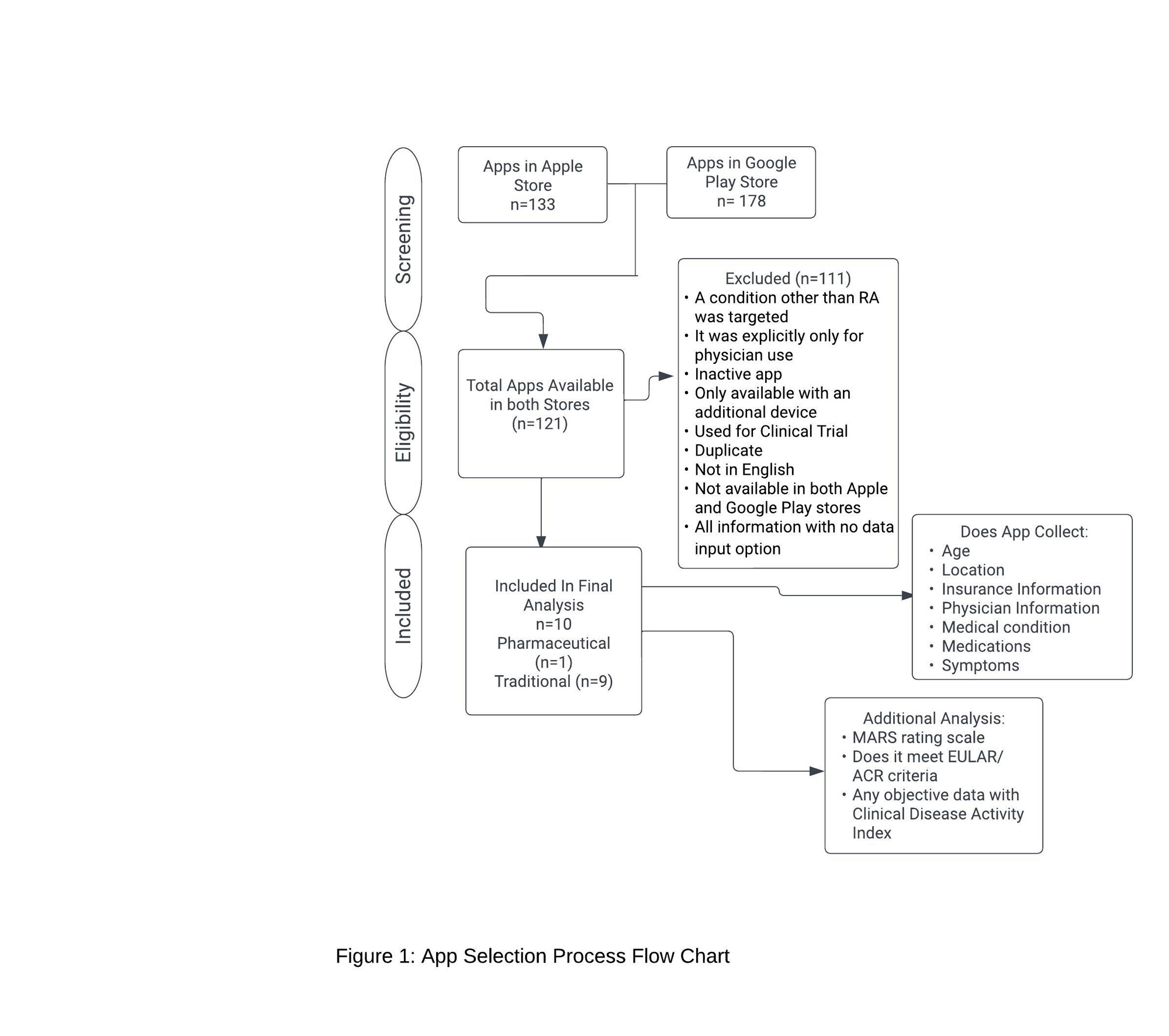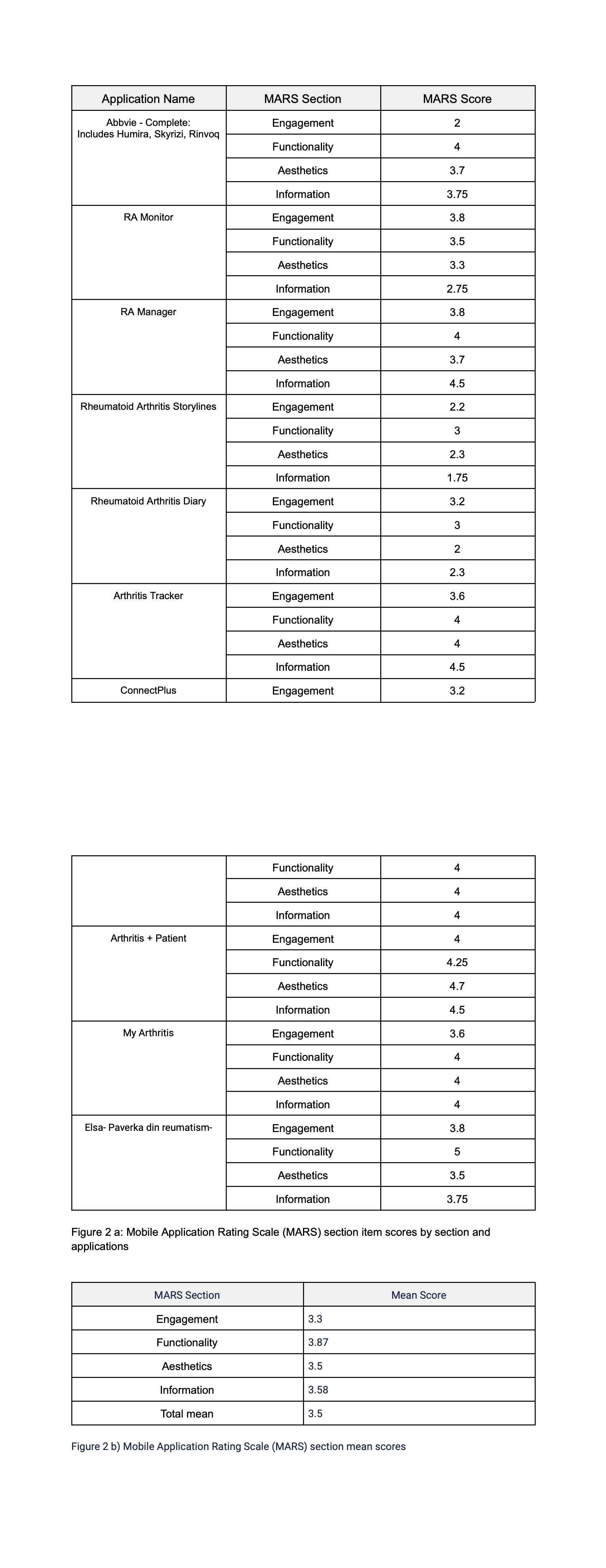Session Information
Date: Tuesday, November 14, 2023
Title: (1895–1912) Measures & Measurement of Healthcare Quality Poster II
Session Type: Poster Session C
Session Time: 9:00AM-11:00AM
Background/Purpose: Rheumatoid Arthritis (RA) is a systemic autoimmune disease characterized by inflammatory polyarthritis with infrequent extra-articular involvement. The management of RA typically requires frequent clinic visits (approximately 7.2 visits/ year) to manage disease activity, as well as to monitor for the toxic effects of the medications prescribed. Evidence shows that mobile health (mHealth) apps, when implemented along with clinic visits, improve medication adherence, patient outcomes, in addition to decreasing health care costs in chronic diseases. The purpose of our study is to evaluate individual mHealth apps for RA from both the Android and Apple store. In addition to rating each app using the Mobile Application Rating Scale (MARS), we aim to assess the factual accuracy of the information provided, as well as the amount of medical and personal data collected by each app. We will also evaluate the 10 EULAR recommendations provided by the task force.
Methods: Each app will be rated by two physicians from the division of Rheumatology. The app searches will be done using Apple Store, and Google Play Store. The search will include the keywords: “arthritis”, “RA”, “rheumatoid arthritis”. Inclusion criteria: 1) available for Android and iOS operating systems 2) in English 3) targets RA as subject matter 4) downloadable in the USA. Exclusion criteria: 1) not directed towards RA 2) explicitly only for physician use 3) inactive app 4) Duplicates 5) only available with an additional device. 6) All information with no data input option. Each mobile app will be rated on the MARS scale. The two physicians were trained prior. Additionally, we will evaluate if applications meet EULAR recommendations. We will compare and contrast the information gathered including demographic, insurance, provider information, and prescription data, as well as evaluate whether it is a pharmaceutical vs traditional app (Figure 1).
Results: Upon initial search, 133 applications were retrieved in the Apple Store and 178 in the Google App Store. Only 121 of the apps were in both stores, and only 10/121 met our inclusion and exclusion criteria. The mean score for MARS rating scare of our apps was 3.5 which indicates an acceptable quality. The lowest scores were found to be in the engagement sections with mean of 3.3, and the highest in functionality with mean of 3.87 (Fig 2a and 2b). Overall, it was found that the best rated apps were those few that were designed by rheumatologists, and had arthritic patients involved. When looking at EULAR criteria, no application met all of them.
Conclusion: To our knowledge, this is the first study using both EULAR recommendations and MARS to systematically analyze RA apps. Mobile apps when used along with traditional visits can help foster compliance to medication, help disease modification and improve morbidity and mortality. Our study further illustrates that the applications that were designed by physicians did the best, which strengthen EULAR’s recommendation. Overall, there are many applications in the app stores, however there are very few that are acceptable. More work and standardization needs to be done with these applications and we should look closer to EULAR guidelines to further optimize these applications.
To cite this abstract in AMA style:
Gonzalez Manrique P, Gilvaz V, Kaler R, Batra N, Reginato A. Systematic Review and Analysis of Mobile Apps for Rheumatoid Arthritis Using the Mobile Application Rating Scale [abstract]. Arthritis Rheumatol. 2023; 75 (suppl 9). https://acrabstracts.org/abstract/systematic-review-and-analysis-of-mobile-apps-for-rheumatoid-arthritis-using-the-mobile-application-rating-scale/. Accessed .« Back to ACR Convergence 2023
ACR Meeting Abstracts - https://acrabstracts.org/abstract/systematic-review-and-analysis-of-mobile-apps-for-rheumatoid-arthritis-using-the-mobile-application-rating-scale/



